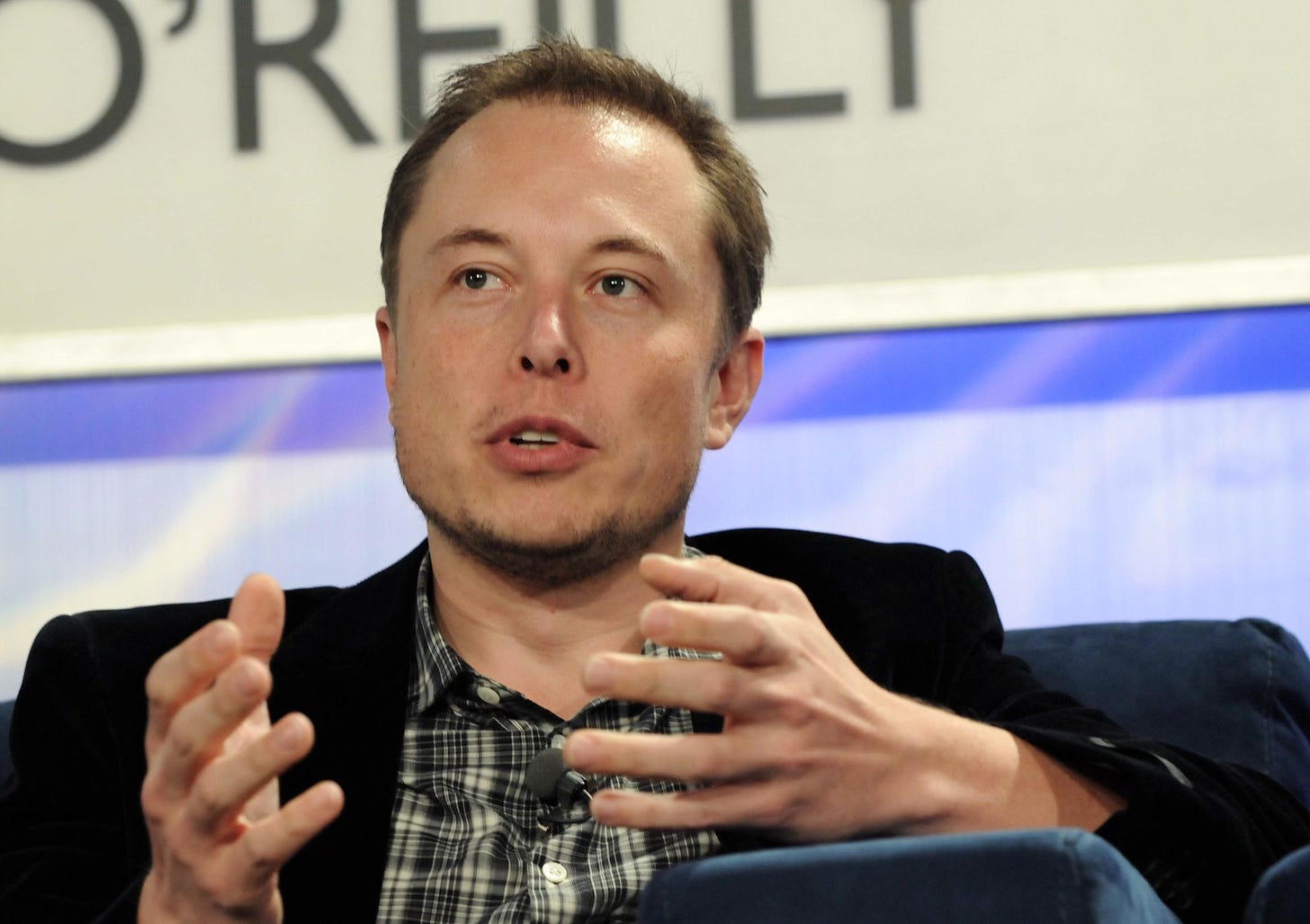Why Tax Revenues Don’t Fund Spending—And Why Elon Musk Is Wrong About The US Government Deficit
MMT points out that currency-Issuing Governments, like the US and UK, don’t need tax income to finance their spending. That’s not to say they are not needed; they are an essential policy tool.

What you will learn:
An understanding of why tax revenues don’t fund government spending in a monetary sovereign country; why ‘government spending cuts’ are actually cuts to private sector income; why taxes are still essential to the functioning of a modern monetary system; why the idea that governments must ‘balance the books like a household’ is misleading; and why Elon Musk’s comments about the US government deficit reflect a fundamental misunderstanding of how money actually works.
Technical Terms/Jargon Used in This Article
You will find definitions of all of the technical terms/jargon used in this article in my series of MMT Economic Jargon Buster articles. Paid subscribers can also download my MMT Dictionary.
Modern Monetary Theory (MMT) Explains Why Musk Is Wrong
Elon Musk, (as the unelected head of the Musk Party?), is running around the White House right now (March 2025), looking for ways to save money for the US Government. He’s worried that: “if the deficit is not brought under control, America will go bankrupt.” Unfortunately, like most people, he is acting on the assumption that governments are just like businesses: and that expenditure must not exceed income or the possibility of bankruptcy awaits. By income, he means taxes collected from citizens or income from government activities.
Musk believes that the government’s ‘debt’ has grown too big and savings must be reduced, or ‘there will be trouble ahead’.
If you have any feedback or questions or if you disagree with anything I write in this article, I want to hear from you. I value your input whether you agree with me or not. Please add your comments in the discussion area
MMT explains how the monetary system really works — and exposes the myth that government debt is dangerous
MMT tells us that Musk’s beliefs are not correct. The US Government cannot go bankrupt (unless the government itself decides it wants to or it decides it would rather make its purchases in a currency other than its own). Simply put, the US Government issues the US dollar. You can’t run out of something you issue yourself.
MMT demonstrates this by reminding us that, firstly, as mentioned above, the US Government issues its own currency and secondly by exposing the workings of the spending process.
By describing the mechanics of the spending process: from government decision making to central bank keystrokes that transfer money to its intended destinations, MMT shows us that when the government decides to spend, the Central Bank is legally required to carry out that spending. It does not have to ‘check the books’ to see if there’s money available, it simply carries out spending requests. Economist Richard Murphy puts it succinctly: “A government can produce money at will by simply telling its central bank to do so.”
This is an indisputable fact. Ben Bernanki, former chair of the US federal reserve tells us how the spending process works,
“When the Fed wants to pay money to a bank it’s not tax money, we simply use the computer to mark up the account” Ben Bernanki, former chair of the US federal reserve
Stephanie Kelton explains it in her ebook, ‘The Deficit Myth’:
“Governments that issue their own currency are not financially constrained in the same way as households or businesses. They can always afford to buy anything for sale in their own currency, including paying people to do useful work…We’ve been conditioned to think of the government's budget like a household budget, but it's not the same.” Stephanie Kelton - Author of ‘The Deficit Myth’.
It is the same in the UK:
“I have not been worried about the state deficit for sometime, ever since Mr Brown found out that the UK state can literally print money to pay its bills”. John Redwood, Conservative MP for Wokingham
‘Government cuts’ are cuts to private sector incomes
What Musk regards as ‘saving money’ is potentially a reduction or elimination of private sector workers’ pay packets. MMT reminds us of the simple logic that there are two sides to every transaction: a government deficit implies a surplus somewhere else, either the private sector or foreign sector; and because of the respective sizes of private sector and foreign sector, in practice that tells us that a government spending cut means less money circulating in the private sector (and less tax income, which ironically, increases the deficit). Potentially, that also means lower economic growth for the US economy. Deficits or surpluses are neither right or wrong, it depends on the circumstances. It may well be correct to run a surplus if the economy is running at full capacity.
If you’re finding value in these articles, become a paid subscriber. Your support allows me to continue to write, teach and to build a community of like-minded individuals—individuals, like you, who understand that MMT offers an opportunity to change the world for the better. Become a paid subscriber now.
Note, that paid subscribers resources are now on this page. Downloadable factsheets, a downloadable dictionary of economic jargon, my book/journal recommendations and more.
The Unavoidable Truth About US Government Spending
The truth is that we don’t need MMT or Richard Murphy to debunk the tax myth: simple logic does the job. Economist Mike Norman illustrates this succinctly, using the following phrase:
“You can’t drain a swimming pool until you fill it up first.”
In other words, citizens can’t pay their taxes unless the money has been spent into the private sector in the first place. Where does that money come from? It comes from the US Government, the monopoly issuer of the US dollar.
So, unless you can argue that taxes can be paid in something other than the state currency (“I’ve decided to pay my taxes using my collection of superhero figures”) or that the US dollar is issued by some other entity than the US Government (“my neighbour makes dollars in his basement”), we can't say that taxes pay for government spending.
What we can say is that, “when citizens pay their taxes they are returning a portion of the money previously spent into the private sector by the government and at that point the money is destroyed”. That seems dramatic, but remember, it’s all just numbers on a computer.
Why do I use the word ‘destroyed’? Well because what is happening is that your debt to the government is ‘struck off’ when you pay it. The money no longer exists, the figure you owed has been marked down on the government’s spreadsheet. If the spreadsheet said you owed $100, and you sent them $100, your balance is zero.
A note on bank lending: Bank loans expand the money supply in the short term but do not add net financial assets to the economy. Unlike government spending, all bank loans have to be paid back; the net result is zero currency has been added to the economy.
A note about ‘the father of MMT’, Warren Mosler and the, ‘taxes don’t fund spending’ phrase. Mosler does not use the phrase ‘taxes don’t fund spending’, instead he focuses on the idea that it is the existence of taxes driving the demand for the currency that allows government spending to take place. In an article on his website called ‘An Interview with the Chairman’ a mock interview, he writes “Government tax receipts do not ‘provide’ funds for government expenditures…Tax collections serve as an aggregate demand management tool and as an instrument to control aggregate financial reserves in the economy; but they never serve as a means of generating cash receipts in order to “finance” government expenditures.”. Having said that, he recognised that the phrase has been a powerful way to help people to understand the nature of government spending: so he has not spent his time correcting people.
A note on government spending: All government spending is new money: although it is spent multiple times within the private sector, it is only issued once by the government. When you pay your taxes, your debt is ‘struck off’. The money no longer exists. It is, therefore, impossible for your tax ‘payment' to be reused.
A note on ‘government money’: The Government Has No Money of Its Own. I should mention that the government has no money of its own: it is only when its currency is issued that it becomes money. The government is not a ‘user’ of money; it is an ‘issuer’ of money. It has money in the abstract as accounting units on spreadsheets; only money that has been issued can be spent.
If Taxes Are Not For Funding Spending, What Are They For?
We’ve learned that for currency-issuing governments, taxation isn’t about raising revenue to fund spending—so does that mean taxes are not needed? No, taxes are important for a number of reasons. Once currency issuing governments are freed from the myth that taxes pay for government services, taxation can be used as a policy tool. Below, I’ve outlined the five most important reasons governments tax and provided a short summary of each.
Why does the US Government need to raise taxes:
To manage inflation.
To create demand for the state's currency.
To redistribute wealth.
To encourage or discourage certain behaviours.
To free up real resources by reducing private sector spending.
Here is a short overview of each of these reasons:
1. Taxes Are Used To Manage Inflation
We have learned that there are no technical restrictions on the ability of the US Government to issue US dollars, however, that does not mean that spending is unlimited. When resources are scarce (for example, at full employment) spending will push up prices. As Richard Murphy explains:
“Tax has a fundamental role to play inside Modern Monetary Theory by cancelling inflation. That is its primary purpose. Unless the money that the government creates is cancelled by tax we will of course get rampant inflation. Everyone within MMT realises this is absolutely essential to keep the economy in balance” Economist and Tax Expert Richard Murphy
From Murphy’s perspective, the principle role of Taxes is to remove money from bank accounts, thus reducing spending power. Reducing spending power reduces the overall demand for goods and services, easing inflationary pressures.
It should be noted that demand side factors are not the only way that inflation occurs or even the most common way. Supply-side factors also have a role to play. For example, increased energy costs, or geopolitical events such as wars and natural disasters, also play a role in creating inflation. Many MMT economists would speculate that supply side factors have historically, been more common as a cause of inflation.
2. Taxes Are Used To Create Demand For The Government’s Currency
MMT tells us that taxation was originally created as a mechanism to get individuals to work for the government (or whoever the local authority was). If slavery is ruled out, they had to find another way—and taxation was that way. The technique is simple: first, create an unavoidable demand for your own currency, for example, by declaring, ‘Pay us 10 UK pounds every year, or we burn your house down.’ Then, provide a way for individuals to obtain that currency so that they can pay their ‘tax’, to keep their house safe. The way to do that is offering a government job that pays in the government’s currency.
The ‘father of MMT,’ Warren Mosler, illustrates this point with his ‘hut tax’ story from his book The 7 Deadly Innocent Frauds of Economic Policy.
“The following is not merely a theoretical concept. It’s exactly what happened in Africa in the 1800s when the British established colonies there to grow crops. The British offered jobs to the local population, but none of them were interested in earning British coins. So the British placed a ‘hut tax’ on all of their dwellings, payable only in British coins. Suddenly, the area was ‘monetized,’ as everyone now needed British coins, and the local population started offering things for sale, as well as their labor, to get the needed coins. The British could then hire them and pay them in British coins to work the fields and grow their crops.” Warren Mosler – The 7 Deadly Innocent Frauds of Economic Policy
Warren’s story illustrates how taxes were used as a coercive tool to compel native Africans to work on behalf of the British colonialists. This method created demand for the government’s currency, allowing the colonial government to secure resources. And as a secondary effect that currency was then used as a basis for markets that allowed buying and selling of goods and service between individuals.
“With tax liabilities in place, the government can buy things with its otherwise worthless dollars, because someone needs the dollars to pay taxes.” —Warren Mosler
By ensuring that individuals are only allowed to use one currency to pay their taxes, i.e. the government’s currency - they are also ensuring the on-going demand for that currency.
3. Taxes Can Be Used To Redistribute Wealth
Market economies have had a tendency to concentrate wealth over time. A progressive tax system can be used to counteracting that imbalance. I.e. by taxing those on higher incomes and wealth at greater rates - while at the same time, taking those on low-income earners at a lower rate.
If we include government spending as part of the ‘tax system,’ then a progressive tax system also implies using public spending to benefit lower-income groups, such as funding public libraries, public schools, healthcare and so on.
Taxes can be used to help ensure that wealthy individuals can’t buy political influence
Taxing wealthy individuals at a higher rate reduces their ability to undermine democracy by buying political influence. Elon Musk’s current actions appears to offer a perfect example: a wealthy individual who has used his wealth to, not only influence politicians, but (I’m looking at it from a outside perspective so this may not be the reality of the situation), seemingly, taking power to make changes directly, without democratic accountability. Huge wealth appears to have allowed Musk to circumvent the democratic process. Or is this a mischaracterisation: perhaps Musk is acting as a civil servant carrying out the order on behalf or the President? Either way, taxation can be used to curb that concentration of wealth and power, making it harder for any one individual to override democratic processes.
Taxing wealthy individuals also reduces their spending power - freeing up real resources in the economy, resources that can be purchased for the benefit of those with less income. For example: to build public houses, offer free medical care and so on.
4. Taxes Are Used To Encourage Or Discourage Certain Behaviours
Economist and tax expert, Richard Murphy explains that by liberating tax from the idea that it is a financial instrument, that frees us up to understand its true power, which is to use it as a policy tool.
“When we’ve liberated tax from the role of raising funds to finance activity it takes on the role of being an agent for change in the economy. We can use tax to reprice those things that the market creates which do however result in harm: alcohol, tobacco and of greater importance now, carbon. We can think about how tax can play a role in reducing our carbon consumption as we move towards a sustainable economy. We can use the tax system to stimulate activities that we want and to suppress others we don’t want, offering tax incentives and allowances… Tax is then fundamentally a social policy instrument rather than a financial policy instrument…It becomes an ethical instrument.” Richard Murphy MMT Mondays: To Tax Or Not To Tax, That is the Question
Taxes can be designed to influence economic choices by making certain activities more or less financially attractive. Higher taxes on polluting industries, tax breaks for ‘green industries. This allows a government to shape behaviour in ways that align with their social as well as their economic goals.
5. Taxes Are Used To Free Up Real Resources By Reducing Private Sector Spending
Another essential role for taxes is the freeing up of private sector resources to allow the government to make use of those resources for its own needs. The government needs labour and materials to build and maintain infrastructure, healthcare and public services. Taxation can be used to reduce private sector spending: i.e. spending on the very resources that the government needs. If the government is competing for scarce resources with businesses within the private sector that can cause inflation. Taxes take money out of the bank accounts of those private sector competitors, thus reducing their spending ability, and weakening their ability to compete for those resources with the government.
In Conclusion: Taxes Started As A Coercive Force – But They Can Also Be A Force for Good
It is clear that taxes do not fund government spending but it is also clear that taxes have an important role to play. Once taxes are free from being defined as a financial instrument, they can be used to shape the economy to meet citizens’ needs. Needs that reflect the aspiration of citizens and the political parties they voted into power.
That’s all for now. Don’t forget to subscribe to support MMT101DOTORG. Spread the word that a better world is possible.
If you have any feedback or questions or if you disagree with anything I write in this article, I want to hear from you. I value your input whether you agree with me or not. Please add your comments in the discussion area
Support MMT101.org by becoming a paid subscriber.
Links to some of my most popular newsletters
Become a paid subscribers for access to additional content:
A Permanent Home for MMT101 Paid Subscriber Resources – Factsheets, book recommendations, academic papers, MMT podcasts and more.
MMT Factsheet 3: If Taxes Are Not For Spending What Are They For?
If you are enjoying these articles and find them a useful part of your Modern Monetary Theory (MMT) education, please support MMT101.ORG—if you can—via small donation. Your help will allow me to continue this work and reach & teach more people. If you can’t do that, consider sharing the articles and podcasts. By subscribing and supporting, not only will you learn how the economy works, but you will also be part of the efforts to change people’s lives for the better. I do not have the power to do that alone, but as an ever-expanding group who understand that there is a better way, we can make a difference.
Thanks,
Jim





I loved your lesson on why taxes do not fund govt spending. First to dispense with Elon. Elon is unelected, unappointed and unconfirmed head of a psuedo-department created by tRump to ostensibly find "waste fraud and abuse" in govt agencies and improve efficiencies. Ironically, they fired the Inspector Generals who did that job, replacing them with Elon and his League of govt destroyers!
Elon, like tRump, is a malignant sociopathic narcissist with delusions of grandeur. He is no genius, but people think he is because of his enormous wealth. According to his biographers , he stole other peoples ideas and his rich corrupt father helped him buy those businesses. The rest is history.
Now he bought his way into the White House by buying tRump's election and saving him from going to jail. ( I hope they both end up in jail)
Back to your tax lesson. I am a huge believer in MMT's compelling explanations on exactly how our monetary system works. Dr. Kelton's "Deficit Myth" book opened my eyes and started me researching all I could find on this school of economics. ( I subscribe to her substack).
I wanted to know more about the exact mechanics of how the receipt of tax money is destroyed and read Dr. Kelton's 1998 Cambridge U paper #244 on "Can Taxes and Bonds Finance Govt Spending". Steve Keen's explanation of the mechanics of this is extremely detailed with accounting proofs. I welcomed your MMT 101 lesson on how taxes are not used to finance spending because it gave me a clearer understanding on some of the "murky" concepts I had trouble grasping.
By the way, I have tried to explain to several of my IRS friends how taxes do not fund govt spending and they would have nothing of it. They insisted my taxes paid for roads, bridges, salaries of govt workers, etc. Did I think that the govt simply burned our tax revenues?!
Phew. MMT has a lot of work to do in the US because we are constantly and unremittingly gaslighted about our tax dollars going to this that and the other, freaking everyone out.....like Elon's insistence that the Federal Govt will be going BANKRUPT if it continues to fund all the "unnecessary" agencies and programs using all the taxpayer money to do it. Real Genius! But it does not say much about all those who believe it.
Thanks for today's lesson. It is in my "Saved" folder. Good work.
A masterpiece on the importance of taxes. This is a must read here. I am also aware of the fact that it will take a ton of work to convince the public that their tax dollars aren't needed to fund anything on a federal level and especially when you have the richest man who owns X constantly lying about the nation's finances which has become far too commonplace in America or even in the UK for that matter. We must begin to realize the difference between those who use the currency (state and local governments, regular people, and the rich) vs currency issuer (the federal government).
Not everyone is going to be convinced on how money works especially mainstream economists but hopefully there will be enough overtime that finally they're able to wake up to the neoliberal nonsense they've been fed for far too long. Again, it will take a lot of work but the work is obviously necessary. It's dire.